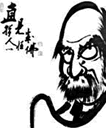I'm reading Sit Down and Shut Up now. As a beginner in shikantaza I really like insights and practical stuff such as this: "Now try to look at the natural spaces between thoughts. Learn what it feels like just to stop generating more and more stuff for your brain to chew on. Now see if you can do that for longer and longer periods. A couple of seconds is fine. Voilà! Thinking not thinking!"
I once experienced something strange (or so I thought) while performing a karate kata (a solo sequence of combat movements) - it was as if during the short gaps between the movements (in Shotokan karate the kata movements have these 'spaces' between them) my thoughts stopped completely. But now I realize these gaps are there if one just tries to pay attention to how thoughts manifest themselves.
I once experienced something strange (or so I thought) while performing a karate kata (a solo sequence of combat movements) - it was as if during the short gaps between the movements (in Shotokan karate the kata movements have these 'spaces' between them) my thoughts stopped completely. But now I realize these gaps are there if one just tries to pay attention to how thoughts manifest themselves.



Comment